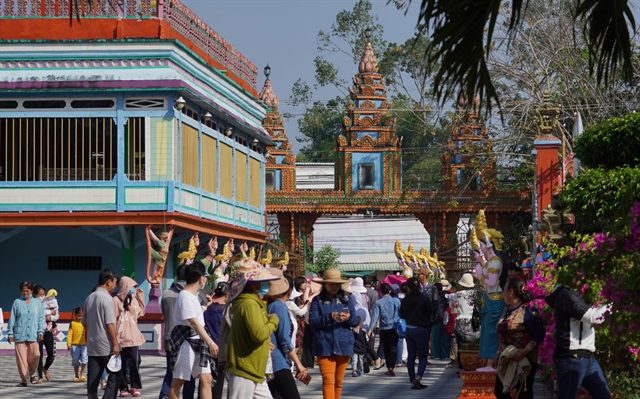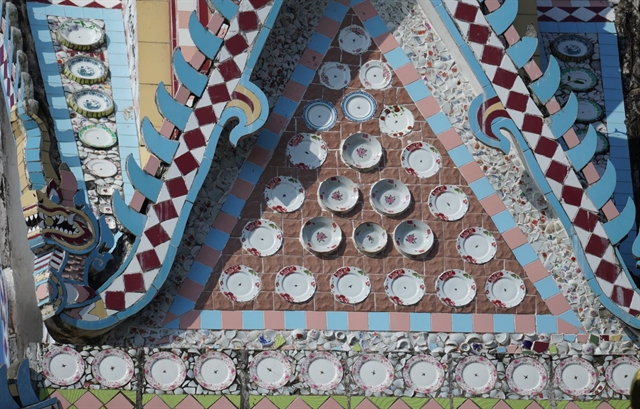The development of tourism in Sóc Trăng province has been identified as a key economic sector through 2030, with a central focus on spiritual tourism connected to the rich culture of the Khmer ethnic group.

Chén Kiểu Temple has a special architecture that attracts various visitors from both within and outside the country. — VNA/VNS Photo
SÓC TRĂNG — The development of tourism in Sóc Trăng Province has been identified as a key economic sector through 2030, with a central focus on spiritual tourism connected to the rich culture of the Khmer ethnic group.
Sóc Trăng is a province with a significant Khmer ethnic population, accounting for over 30 per cent of the province’s population.
The province has 93 Theravada Buddhist Khmer temples.
About 10 kilometres from Sóc Trăng City centre, Chén Kiểu Temple, also known as Sà Lôn Temple, is a Khmer temple located in Đại Tâm Commune in Mỹ Xuyên District, and is well-known to many domestic tourists for its unique architecture.
Lâm Sơn Hiển, deputy secretary of the Đại Tâm Commune's Party's Committee, said that the distinct feature of Chén Kiểu Temple lies in its intricately decorated walls, adorned with ceramic plates, bowls, and dishes.
Every year, over 200,000 visitors from both within and outside the country come to Đại Tâm to explore the traditional culture of the Khmer people and admire the unique architecture of Chén Kiểu Temple.
Visitors to Đại Tâm can also purchase traditional Khmer products such as flat rice flakes, ginger cakes, and sticky rice cakes.
This helps the Khmer people increase their income, develop their economy, and sustainably reduce poverty.
Currently, the average income of people in Đại Tâm Commune is over VNĐ76.2 million per person per year.
Phòng Phú Thịnh, a resident of Đại Tâm Commune, shared that the Khmer people here are always proud of and work to preserve their cultural heritage.
In addition to the special architecture of Chén Kiểu Temple, the Khmer community has developed music clubs, traditional dances, and many agricultural products and specialties to introduce and sell to tourists, further increasing their income.
Huỳnh Thị Lan, a tourist from HCM City, said that when visiting Sóc Trăng, her group wanted to visit Khmer temples to learn about the traditional culture of the Khmer people and enjoy local delicacies.
After visiting Chén Kiểu Temple, Lan was very impressed with the temple's unique architecture and the Khmer people's friendliness, hospitality, and enthusiasm in introducing the history of the monuments, their agricultural products, and the significance of Khmer cuisine and specialties.

Chén Kiểu Temple uses bowls and dishes sent by locals to decorate the exterior of the temple. — VNA/VNS Photo
In Phú Tân Commune, Châu Thành District, the Khmer people's traditional handicraft village also attracts many tourists for visits and shopping.
To preserve and promote traditional Khmer products, the local government established the Thủy Tuyết Bamboo and Rattan Cooperative.
According to Trương Thị Bạch Thủy, director of the cooperative, the cooperative currently provides over 700 products to the domestic and export markets.
The cooperative is aiming to combine production with tourism and services among local households to gradually enhance the value of the craft village and promote its products to tourists.
At the moment, the 93 Khmer temples in the province, with their unique architecture, are becoming attractive tourist destinations in Sóc Trăng. The province has identified 10 key tourism products for effective implementation.
Investment will focus on four main temples, including Mahatup (Dơi Temple), Sro Lôn (Sà Lôn or Chén Kiểu Temple), Bô Tum Vong Sa Som Rong, and Prés Buône Prés Phék (Four-Faced Temple).
Relevant authorities are also implementing a plan for the traditional cultural model of ethnic groups under the project “Preserving and Promoting the Good Traditional Cultural Values of Ethnic Minorities in Connection with Tourism Development.”
The project is scheduled for 2024 in Phú Tân Commune, Châu Thành District, with a budget of over VNĐ2 billion.
The project aims to further promote ethnic minorities’ traditional culture, linked to local tourism development.
The project will establish a club to introduce various forms of Khmer cultural arts, traditional crafts, and performances.
Phạm Văn Đâu, deputy director of the Sóc Trăng Department of Culture, Sports, and Tourism, said that as of early 2024, the province welcomed nearly 2.45 million visitors, including 51,900 international tourists and 418,500 overnight guests. Total revenue from tourism reached VNĐ1.32 trillion. VNS